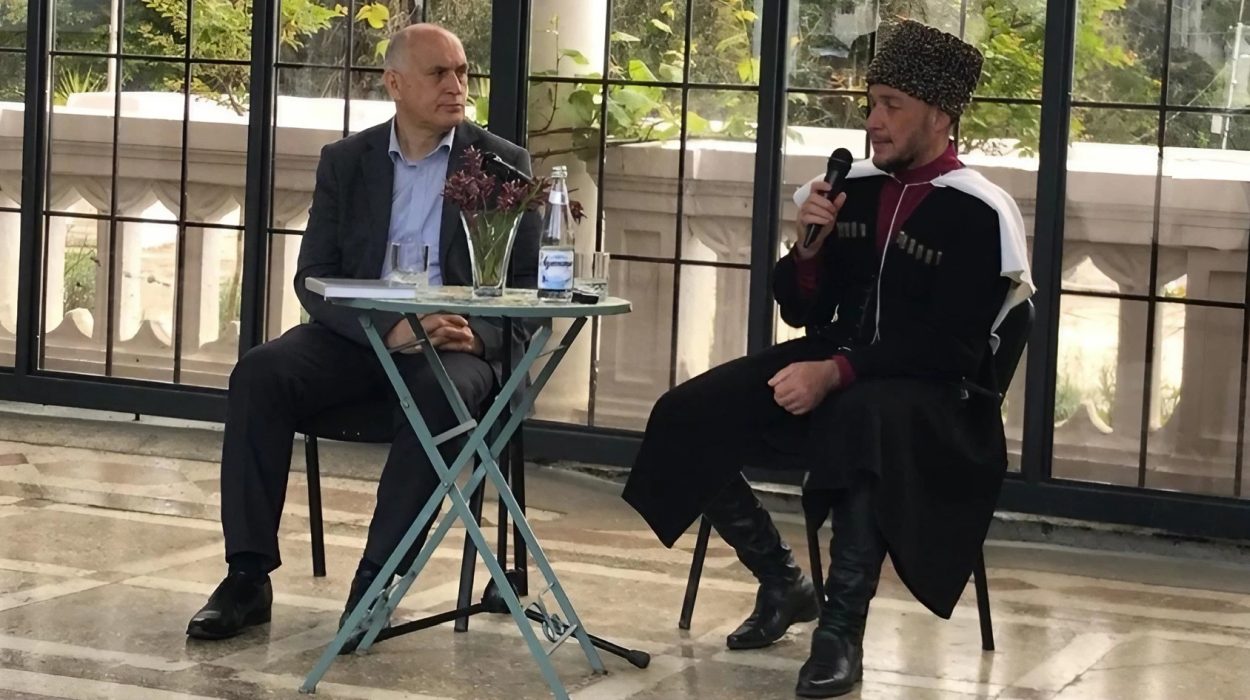Echoes of the Past: Abkhazia Recalls the End of the Russian-Caucasian War

Viacheslav Chirikba (left) and Aslanbek Mirzoev
SUKHUM / AQW'A — Today, Sukhum hosted a series of memorial activities in honour of the Day of Remembrance of the Victims of the Russian-Caucasian War. This day, 21st May, marks the end of the Russian-Caucasian War in 1864, a war that spanned from 1817 to 1864, forcing tens of thousands of Caucasians, including Abkhazians, into exile from their native land to the then Ottoman Empire.
The cultural and business site "Guma" is currently hosting an exhibition of the distinguished artist Batal Dzhapua's graphic works. His illustrations for Bagrat Shinkuba's renowned novel "The Last of the Departed" are prominently on display. In addition, this commemorative event featured insights by esteemed scholars - Aslanbek Mirzoev, a candidate of historical sciences and Hero of Abkhazia, and Viacheslav Chirikba, Doctor of Philological Sciences and Director of the Center for Strategic Studies under the President of the Republic of Abkhazia.
Mirzoev elaborated on the origins, progression, and tragic aftermath of the Russian-Caucasian War, drawing attention to the fact that Russia's systematic encroachment into the Caucasus started much before 1817, the year officially recognised as the beginning of the Russian-Caucasian War. He traced the roots of conflict back to the construction of Kizlyar in 1735, which marked the start of the Caucasian line of fortifications. The establishment of Mozdok followed in 1763. Post the Russo-Turkish War of 1768-1774, Empress Catherine II authorised the erection of a line of outposts. Mirzoev highlighted that the 18th century was punctuated by sporadic clashes between Russia and the highlanders, leading to the repression and forced displacement of highlander communities. Regrettably, these practices did not cease even after the conclusion of the war in 1864."
+ Viacheslav Chirikba. "The Ubykh People Were in Practice Consumed in the Flames of the Fight for Freedom"
+ From Guma to Abzhywa: Tracing the Journey of Abkhazian Dialects with Viacheslav Chirikba
+ 159 Years Later: Day of Remembrance of the Russian-Caucasian War Victims
Viacheslav Chirikba, in his discourse, illuminated the profound impact the events of the 19th century had on the Abkhaz language dialects. Historically, Abkhazia was a land of linguistic diversity with five distinct dialects - Abzhywa, Tsabal, Bzyb, Sadz, Ahchypsy, along with the Guma sub-dialect. However, the present paints a starkly different picture with just two dialects - Abzhywa and Bzyb - standing the test of time. The villages which echoed with other dialects and vernaculars now lie largely desolate.
"Prior to the mid-19th century, or before the onset of Mukhazhirism, five dialects thrived in Abkhazia. Regrettably, today, all dialects, barring Bzyb and Abzhywa, have survived only in Turkey," Chirikba observed. He gave the example of the Guma dialect, which was the language of choice in around 50 villages. Among these, Bagmaran, Marh'yaul, and partly Eshera, remain as the last bastions of this dialect. Surprisingly, about ten Abkhaz villages in Turkey continue to speak in this vernacular. The event was organised under the auspices of the State Committee for Youth and Sports.
Today's exhibition features nine graphic masterpieces from artist Batal Dzhapua, serving as illustrations for Bagrat Shinkuba's 'The Last of the Departed.' This showcase aims to shed light on the tragic era that left an indelible mark on the peoples of the Caucasus. We remember that many of our compatriots were forcibly relocated to Turkey (Ottoman empire) during this period. It's our conviction that it's crucial for the younger generation to be aware of their history and to ensure it is never forgotten," stated Idris Kara-Osman-ogly, Head of the Department of Youth Policy of the State Committee for Youth and Sports.